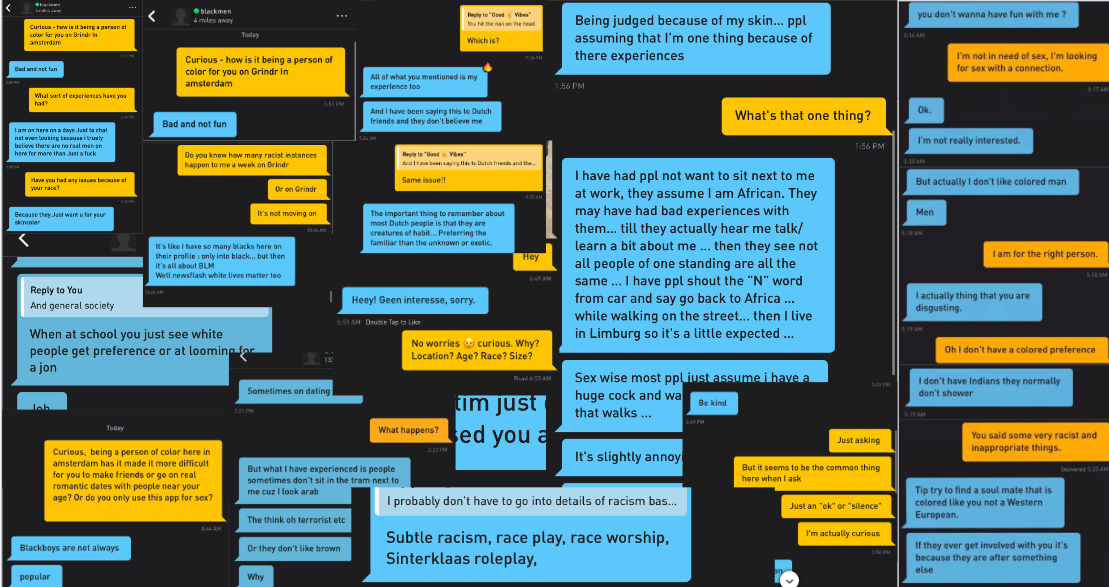Racism within the gay community in Amsterdam and the Netherlands is a
complex and often overlooked issue. A cursory search online reveals a
startling lack of information, with only eight articles found in Dutch.
Why is there such a scarcity of information on this subject? Is it
indicative of a broader societal reluctance to address racism within the
LGBTQ+ community?
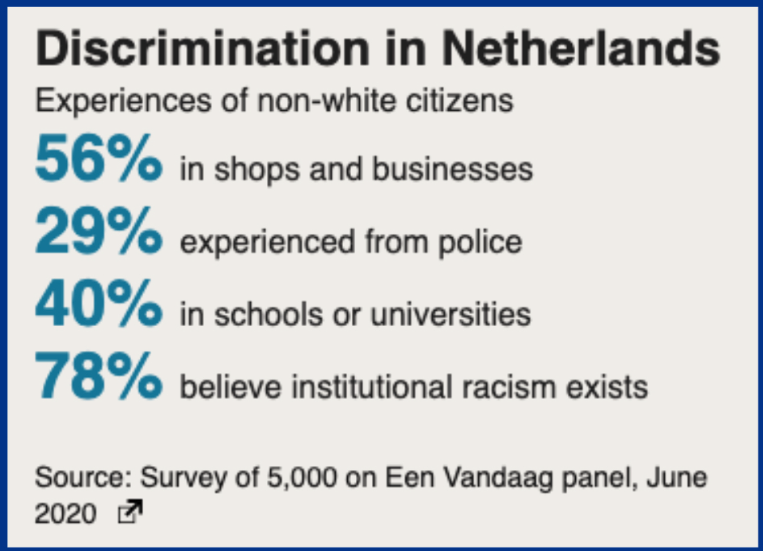
Amsterdam’s Reputation as a Progressive City
Historically, Amsterdam has been known for its liberal and progressive attitudes, especially towards LGBTQ+ rights. The Netherlands was the first country in the world to legalize same-sex marriage in 2001. However, this progressive image does not necessarily translate into the lived experiences of all individuals, particularly those from racial and ethnic minority backgrounds.
Racism in the Netherlands
The Netherlands, like many European countries, has grappled with issues of racism and discrimination. This includes both overt acts of racism and more subtle forms of bias and exclusion. The intersection of LGBTQ+ identity with racial or ethnic identity can compound these challenges.
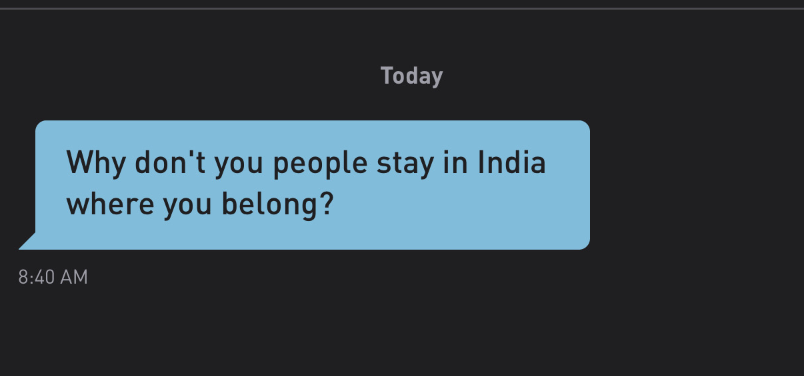
Online Dating and Bias
Research in various countries has shown that racial biases can be pronounced in online dating environments, including platforms like Grindr. Preferences for certain racial or ethnic groups can be framed as “just a preference,” but they often reflect deeper biases and stereotypes.
Challenges for LGBTQ+ People of Color
LGBTQ+ individuals who are also part of racial or ethnic minority groups often face unique challenges. They may experience discrimination or exclusion within both their racial or ethnic community and the broader LGBTQ+ community. This intersectionality can make it more difficult to find support and connection.
A/B Testing: An Eye-Opening Experiment
To explore this issue, I conducted two A/B tests using online profiles to gauge reactions based on racial features. The results were both revealing and concerning.
Experiment 1
- Method: Using two Android devices, I created profiles with semi-viewable faces, one with black features and the other with white features. No additional profile information was provided.
- Results: The profile with black features received 43 views, while the profile with white features received 407 views in the same time frame and location.
- Question: Is this disparity indicative of a broader trend of racial bias within the community?
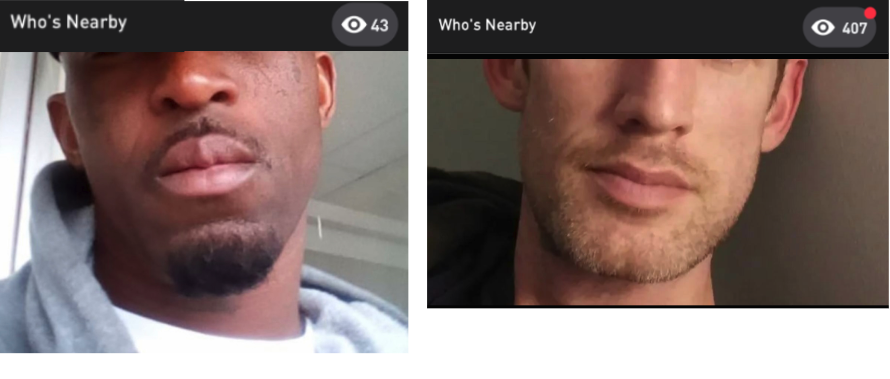
Experiment 2
- Method: I used two different photos with the exact same profile information and ran them concurrently for 48 hours.
- Results: The profile with darker skin received 9 solicitations for sex (3 of those responses were very focused on a bias towards colored men) and 0 for social activities. Likewise the lighter-skinned profile received 17 solicitations for sex (none mentioning color) and 6 invitations for drinks/walks.
- Question: How does race factor into not only romantic or sexual preferences but also into forming friendships?
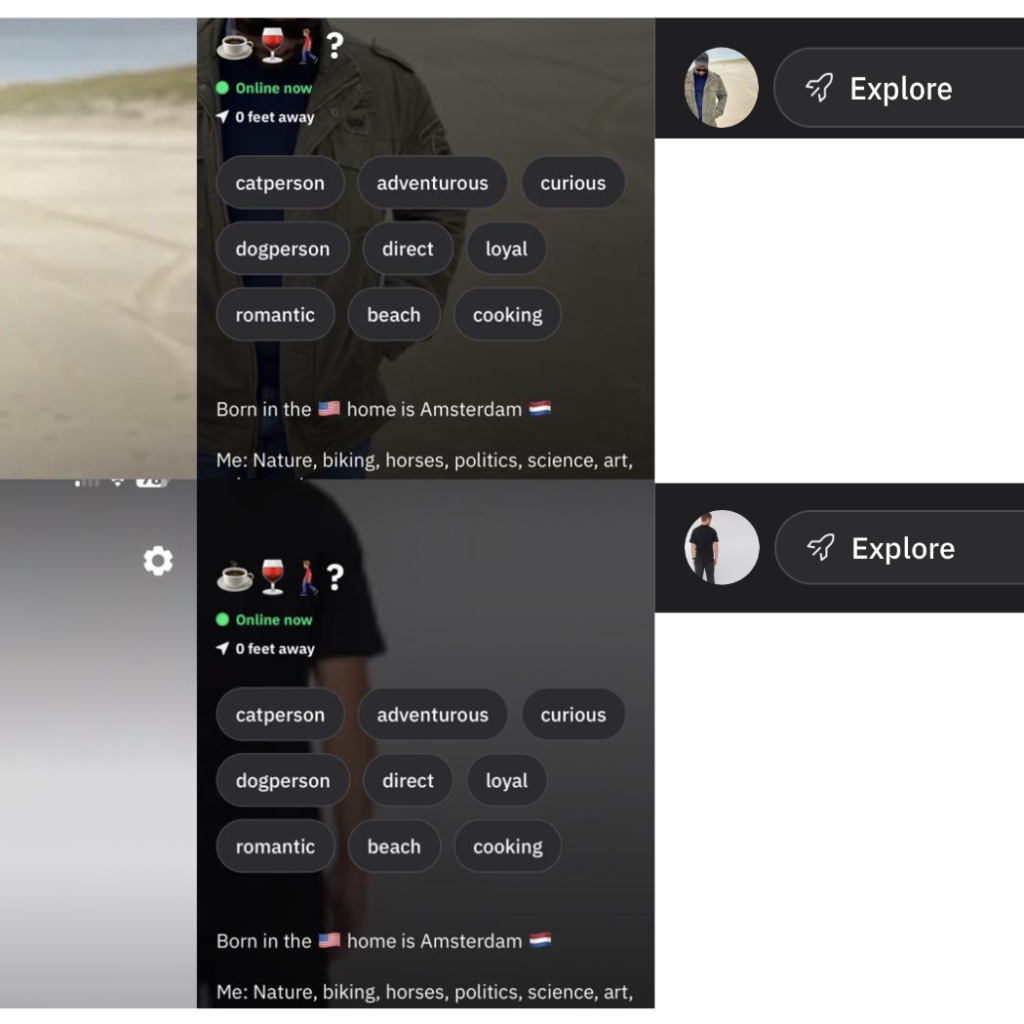
Conversations with People of Color in the Netherlands
To delve deeper, I spoke with a few people of color in the Netherlands. Initially, I was able to find no more than 75 individuals who were openly identifying as LGBTQ+ at any given time across the country. This limited number prompted further investigation, revealing a complex issue.
Many people of color within the LGBTQ+ community were not openly out, a phenomenon that can be attributed to various societal pressures and cultural factors. In some cultural backgrounds present in the Netherlands, there may be strong familial or community expectations regarding sexuality and gender roles. These expectations can create an environment where individuals feel unable to express their true selves.
Furthermore, the intersection of racial or ethnic identity with LGBTQ+ identity can compound these challenges. People of color may already face discrimination or exclusion based on their racial or ethnic background, and coming out as LGBTQ+ might expose them to additional biases or misunderstandings. The fear of rejection or judgment from both their racial or ethnic community and the broader society can lead to a reluctance to come out.
Utilizing geographical location settings, I navigated to different cities to understand their unique challenges. Unsurprisingly, these issues were consistent across various locations, reflecting a broader pattern of hidden struggles within the community.
Here are some excerpts from our conversations: The yellow is me and the blue is the chat partner. Keep in mind they are from various individuals.
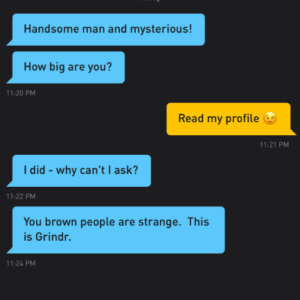
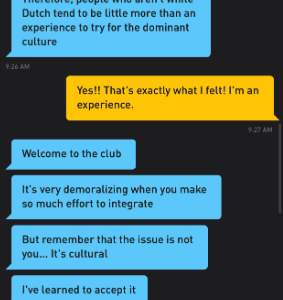
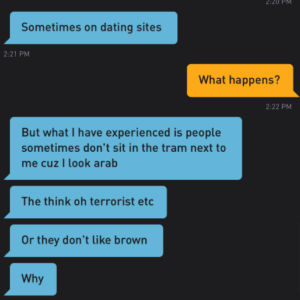
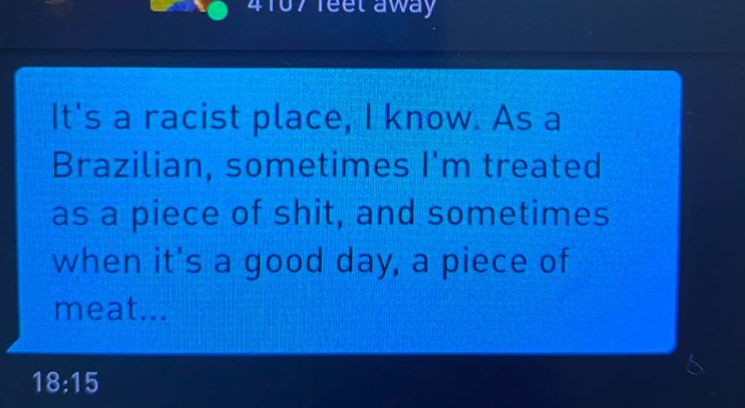
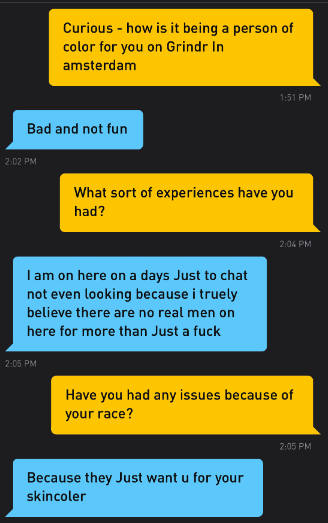

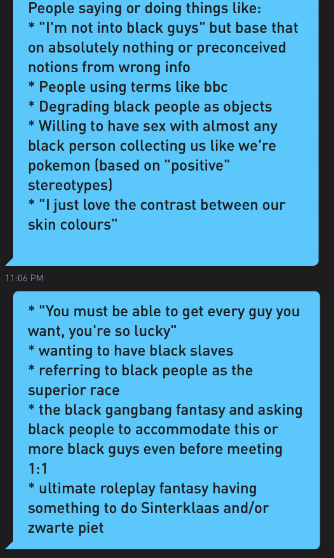
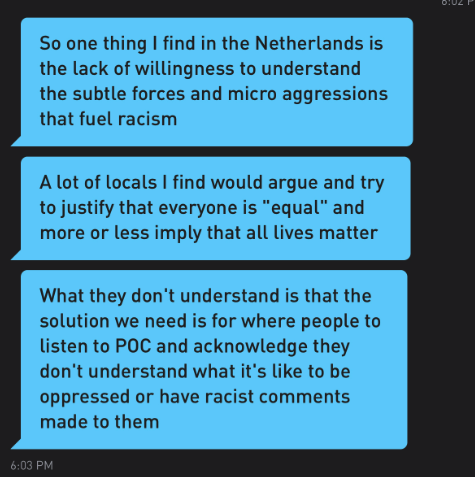
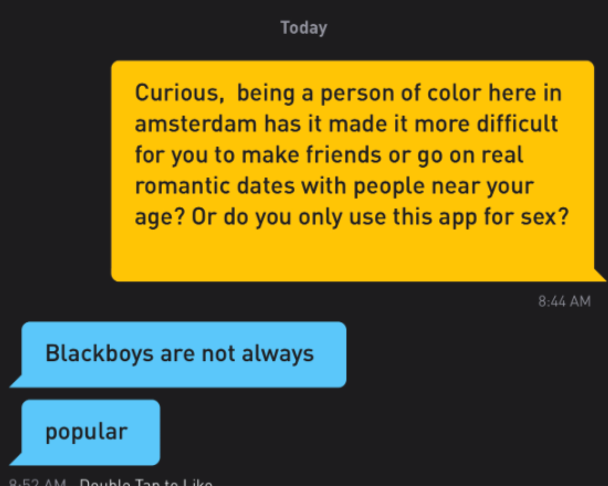
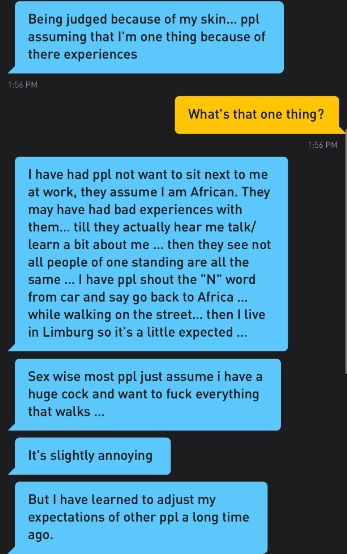
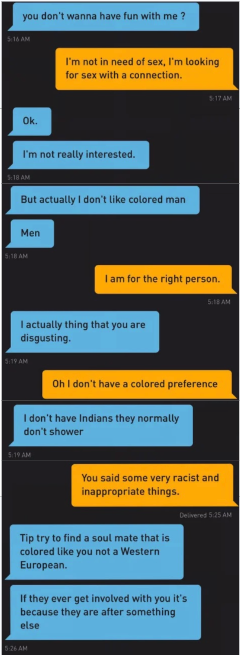
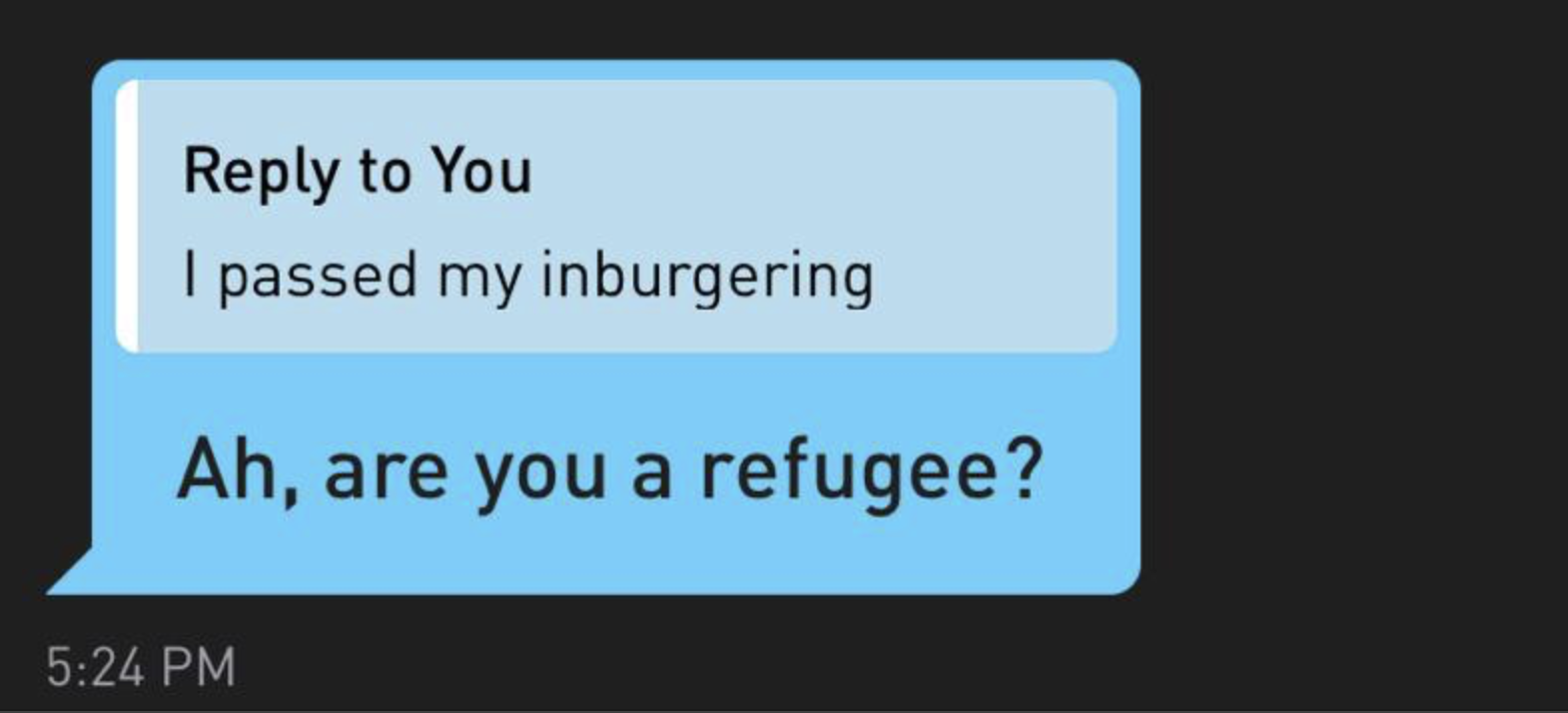
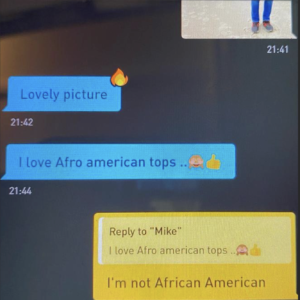
Racism on Grindr and Other Platforms
A study highlighted by Gaykrant revealed that racism on Grindr, a popular gay dating app, is a prevalent issue. Phrases like “I don’t fall for black men” are often dismissed as personal preferences rather than recognized as racism.
A report by the European Union Agency for Fundamental Rights found that 54% of LGBTI respondents in the Netherlands felt discriminated against or harassed due to their ethnic origin or immigrant background.
VICE and OneWorld have also reported on the issue, highlighting the ways in which racism is justified by users on platforms like Grindr.
Government and Community Response
The Dutch government and various organizations have taken steps to address racism and discrimination, including within the LGBTQ+ community. This includes anti-discrimination laws, educational initiatives, and support for community organizations.
If you need help – reach out to COC Netherlands. COC Nederland, also known as COC Netherlands, is a Dutch LGBTQ+ rights group founded in 1946. COC originally stood for Cultuur en Ontspanningscentrum (Center for Culture and Leisure), which was intended as a “cover” name for its real purpose. It is the oldest existing LGBT organization in the world. The local organizations focus on activities and advocacy within their region. They offer personal support, support groups, information, giving educational lessons at high schools, and provide venues where gays and lesbians can meet. They also promote lesbian and homosexual interest. The local organizations are run almost exclusively by volunteers.
Reflecting on Microaggressions and Racial Biases
In our daily lives, many of us encounter subtle yet persistent forms of racial bias. Personally, I face an average of 1-2 racially tinged comments weekly across various platforms, not just limited to Grindr. Even in casual social settings, I’ve been met with uninformed questions about my cultural background, despite my clarifications about being US-born.
This discrimination isn’t confined to the digital realm of dating apps. It seeps into everyday experiences, from interactions in stores, bars, and restaurants to the process of building friendships. While I am open to dating individuals from all racial backgrounds – given my colorful ex-boyfriend history 😉 … that’s another blog post 😀 – I’ve noticed certain trends. Newcomers from ABC (Aruba, Bonaire, Curacao) or specific Arab cultures often prefer dating within their communities. In contrast, many from Asian backgrounds lean towards dating locals, perhaps as an effort to integrate more seamlessly.
Considering the racial breakdown: Dutch 76.9%, EU 6.4%, Turkish 2.4%, Moroccan 2.3%, Indonesian 2.1%, German 2.1%, Surinamese 2%, Polish 1%, (basically 86.4% of the population being white in the Netherlands), the challenges for non-white individuals in the Netherlands become starkly evident. Especially for those who aren’t openly out, navigating the dating scene or even establishing friendships can be an uphill battle. While some find understanding peers, many face a continuous struggle for acceptance.
Pause for a moment and reflect: How diverse is your friend circle, ethnically speaking? When on a date, take a cursory look at their social media might offer insights into the diversity of their acquaintances.
For those who’ve moved to the Netherlands, the desire to integrate often clashes with feelings of exclusion and undervaluation. It’s a daily challenge, confronting these barriers at every turn.
I urge you to engage with your friends of color. Listen to their stories, not as mere anecdotes but as genuine experiences that shape their lives. My journey, despite the friendships and relationships I’ve formed with Dutch individuals, has been fraught with challenges. The pain of racial rejection isn’t limited to online interactions; it’s a reality in places you’d least expect, from the service industry to social meet-up groups. As we navigate these challenges, it’s imperative to amplify these voices, challenge our biases, and strive for a more inclusive society.

